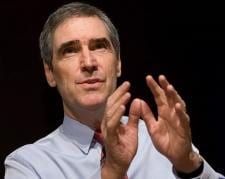It was initially supposed to be a leadership convention, but with only one contender for the crown, interim Liberal Party leader Michael Ignatieff is going to see a coronation instead.
The Liberal convention, taking place this weekend in Vancouver, will instead focus more on policy as well as re-invigorating the party, thus giving it the moniker of a “renewal convention.”
“This convention is not about revealing the end-point or presenting a completed product to either the members or Canada through the media,” says MP Justin Trudeau, the convention co-chair. “It’s about kicking off the conversation that’s going to take the next few years, about how a modern political party operates within a wireless world.”
And then there’s the policy discussions. Beginning in December, the party launched En Famille, a members-only online forum for discussing policy beginning at the riding level.
“We started off with every riding submitting 10 policies, and then whittled down — vote, vote, vote — and then we came up with [those] that will be voted on and discussed at the convention,” says Denis Schryburt, riding president for Ottawa Centre. “Definitely policy is heavy.”
Perhaps more significantly than policy is the fact that this may be the last delegated political convention in Canadian history, as the party looks to adopt a one-member one-vote system for future leaderships — an idea that was narrowly defeated at the previous convention.
“It was heavily debated, and a very passionate discussion,” says Schryburt, who sat on the committee exploring the options.
Among the concerns to be addressed include safeguarding against a rush of new party members that would join in the lead-up to a leadership vote. Others want votes to be weighted nationally so that the party’s urban members in places like Toronto and Vancouver don’t determine policy for the rest of the country.
“Switching away from delegated conventions is like starting to publish the Bible in English or in French, not in Latin,” Trudeau says. “There’s a reaching out and a demystifying, and a direct connection between democracy and the Liberal Party of Canada, and ordinary Canadians. Yes, there will be some growing pains, yes there will be adjustments, yes there will be some things that we lose, but the things that we gain will more than make up for that.”
The party also plans to vote on ways to streamline the national organization, creating new country-wide standards for things like membership fees, which had previously been set by individual provincial wings. As well, it is expected that they will begin training volunteers on the new voter database software used by Barack Obama’s strategists in the US.
While no one is letting on just what the policy resolutions being debated will be, progressive groups have wishlists prepared.
“One thing that we’ve been pushing for, for a while, is a draft Prevention of Torture Act, which comes from the recommendations from the Maher Arar inquiry,” says David Eby, executive director of the BC Civil Liberties Association. “We’ve been trying to get Mr Ignatieff to adopt that proposed legislation as part of his party’s agenda.”
Eby also hopes the party will commit to the repatriation of Omar Khadr from Guantanamo Bay, as well as for progressive approaches to drug laws.
“That’s an ongoing concern of our association, including the decriminalization and regulation of marijuana, the promotion of substitution therapies for people with addictions to crack cocaine, heroin or crystal meth,” says Eby.
Liberal MP Keith Martin says that the issue of decriminalization is likely to come up on the floor of the convention.
“The Young Liberals have been pushing for it,” Martin confirms, along with his own bill that would decriminalize the possession of up to two pot plants.
Peter Bochove of the Committee to Abolish the Nineteenth Century hopes the party will pledge to re-establish the committee looking into the country’s sex laws, though he is willing to be patient.
“I don’t expect to see anything come out of the convention in that area, however I think that after the election, a great deal of lobbying would get us where we want to go, which is to reopen the dialogue,” Bochove says.
“I would love to see them reopen this entire discussion and get this whole thing back on track so that they can deal with the prostitution laws, and I would like to see the bawdyhouse laws off the books,” Bochove says. “They’re no longer enforceable because of the Supreme Court decision on the swingers clubs, but they’re still on the books which means they can still be used, so that needs to go.”


 Why you can trust Xtra
Why you can trust Xtra


